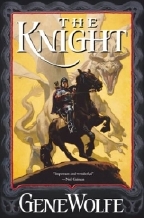The Knight
Gene Wolfe
Tor
US Hardcover First
ISBN 0-765-30989-0
Publication Date: 01-03-2004
Pages: 432; Price: $25.95
Date Reviewed: 01-22-04
Reviewed by: Katie Dean © 2004

REFERENCES
COLUMNS
|
|
|
The KnightGene WolfeTorUS Hardcover FirstISBN 0-765-30989-0Publication Date: 01-03-2004Pages: 432; Price: $25.95Date Reviewed: 01-22-04Reviewed by: Katie Dean © 2004 |
|
|
REFERENCES |
COLUMNS |
For fans of Gene Wolfe, 'The Knight' is unlikely to disappoint. First in the series 'The Wizard-Knight', this fantasy tale draws its inspiration from myth and legend. It is packed with evocative descriptions, but is definitely not a book for those who like a neat ending. Gene Wolfe has gained something of a reputation for oblique writing and his latest novel is no exception. He hints at large and potentially complex themes, but ultimately provides far more questions than answers.
The novel is narrated by its hero, the Knight, Sir Able of the High Heart, who is writing a letter home to his brother trying to explain the strange adventures into which he has been plunged. This same hero is in actual fact a teenage boy from America who mysteriously passes into a fantasy world. The brother to whom he writes is the elder brother, Ben, presumably still living in America and perhaps wondering what has become of his sibling. It is by no means clear that this is really the case, however, but this is a point to which I will return later. Not only is this teenage boy transported into a magical realm, he soon finds his body transformed into that of a man whilst his mind remains that of a boy. The skill with which Wolfe captures this anomaly in his prose is unfortunately mixed. The opening chapters promise much, with the writer's voice like that of a child, or young teenager. However, this style changes as the novel progresses, but without any attempt at natural development. One minute the voice is that of a boy younger than his true years, the next he is neither man nor boy. It is probable that a boy transformed into a man overnight and treated as a man by all he meets would be forced to follow a steep learning curve and this progression would present an interesting path to follow. The idea is tantalising, but woefully under-developed by Wolfe.
The fantasy setting is a realm of seven worlds peopled by humans, giants, elves, dragons and knights. Wolfe draws upon traditional beliefs regarding the various natures of these mythical creatures, but resists the temptation to enter into too many details. The seven worlds are arranged as a series of layers, one on top of the other. For some, like Sir Able, it is possible to travel between the worlds and he finds himself propelled between the human and elf kingdoms seemingly at random. This becomes an excuse to drop hints of myth and legend into the story. For example, the world above Sir Able's, Skai, becomes the habitation of those regarded by humans as their gods. This world bears striking resemblances to Norse mythology. It is refreshing to read a fantasy that purports to draw upon the rich beliefs of other cultures and times, but a pity that this rich source of inspiration has been rather haphazardly employed, resulting in incoherence. Wolfe's descriptive powers bring the disparate scenes to life, but the whole leaves one with an impression of confusion rather than mystery.
In many ways 'The Knight' is a play on our ideas of time and place. Wolfe allows time to move at different rates in each world. A day in Aelfrice can equate to as much as a few years in Sir Able's world of Mythgarthr. Presumably time is similarly warped in the other worlds. Early in the novel Sir Able befriends an old man, Bold Berthold, who is convinced that the boy is his long-lost younger brother who disappeared many years previously. He would have expected the brother to be a man, so is nonplussed when Able acquires his masculine form. This, however, suggests a parallel with the American boy Able believes himself to be. Will he one day return to America in a similarly mysterious manner and surprise his brother Ben with his reappearance? Perhaps on the other hand, he will return to find that time has stood still in America. Once again, these are not new ideas. Perhaps most famously, C.S. Lewis made use of a similar play on the idea of time in his 'Narnia' chronicles.
In comparison with much of the fantasy published today, Wolfe's approach is refreshing. He hints at some interesting themes and ideas, but few are truly original and none are developed in a sufficiently interesting or compelling manner to hold the reader's attention. Wolfe's style of introducing mystery upon mystery through oblique references to past or future events and discoveries soon wanes when none of those mysteries is solved. One begins to wonder whether Wolfe himself has any answers, certainly none he wishes to share with his readers. Despite these strong reservations, 'The Knight' offers some compelling and evocative descriptions and perhaps its sequel, 'The Wizard' will tie up some of the many loose ends.